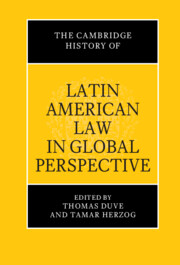(image source: CUP)
Abstract:
Covering the precolonial period to the present, The Cambridge History of Latin American Law in Global Perspective provides a comprehensive overview of Latin American law, revealing the vast commonalities and differences within the continent as well as entanglements with countries around the world. Bringing together experts from across the Americas and Europe, this innovative treatment of Latin American law explains how law operated in different historical settings, introduces a wide variety of sources of legal knowledge, and focuses on law as a social practice. It sheds light on topics such as the history of indigenous peoples' laws, the significance of religion in law, Latin American independences, national constitutions and codifications, human rights, dictatorships, transitional justice and legal pluralism, and a broad panorama of key aspects of the history of statehood and law. This title is also available as Open Access on Cambridge Core.
On the editors:
Thomas Duve, Max Planck Institute for Legal History and Legal Theory, Frankfurt Thomas Duve is a director at the Max Planck Institute for Legal History and Legal Theory, and Professor of Comparative Legal History at Goethe University, Frankfurt. An expert in European and Latin American legal history, he specializes in the history of law and religion in a global perspective. Tamar Herzog, Harvard University, Massachusetts Tamar Herzog is the Monroe Gutman Professor of Latin American Affairs at Harvard University and an affiliated faculty member at the Harvard Law School. She is a legal historian of Spain, Portugal, and their overseas territories, having worked on colonial administration, penal justice, scribes, citizenship, land rights, and territorial conflicts.
Table of contents:
Introduction Thomas Duve and Tamar Herzog
1. What is a legal history of Latin American law in a global perspective?
1.1 How was and is Latin American legal history written? Carlos Petit
1.2 What is a legal history and how does it relate to other histories? Tamar Herzog
1.3 How is law produced? Thomas Duve
1.4 What is global legal history and how can it be done? Mariana Dias Paes
2. How to approach indigenous law? Caroline Cunill
3. How to approach colonial law?
3.1 A civil law for a religious society Tamar Herzog
3.2 Religious normativity for colonial empires Thomas Duve
3.3 The domestic sphere Romina Zamora
4. Independence(s): what is a revolutionary law? Tamar Herzog
5. The coming of states? The nineteenth century
5.1 Constitutions José María Portillo
5.2 Codifications Agustín Parise
5.3 Contestations and exclusions Monica Dantas and Roberto Saba
6. The omnipresence of the state? The twentieth century
6.1 Towards the administrative state Eduardo Zimmermann
6.2 Dictatorships Cristiano Paixão
6.3 Transitional justice and human rights Ruti Teitel and Valeria Vegh Weis7. Beyond the state – can state law survive in the twenty-first century? Daniel Bonilla Maldonado.
Read more here. (this book is in open access)


No comments:
Post a Comment